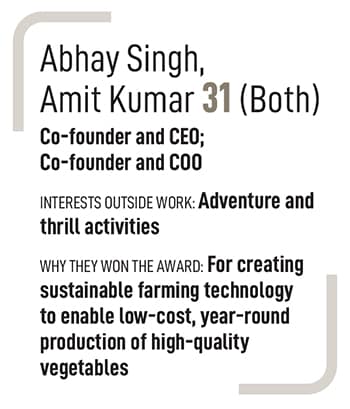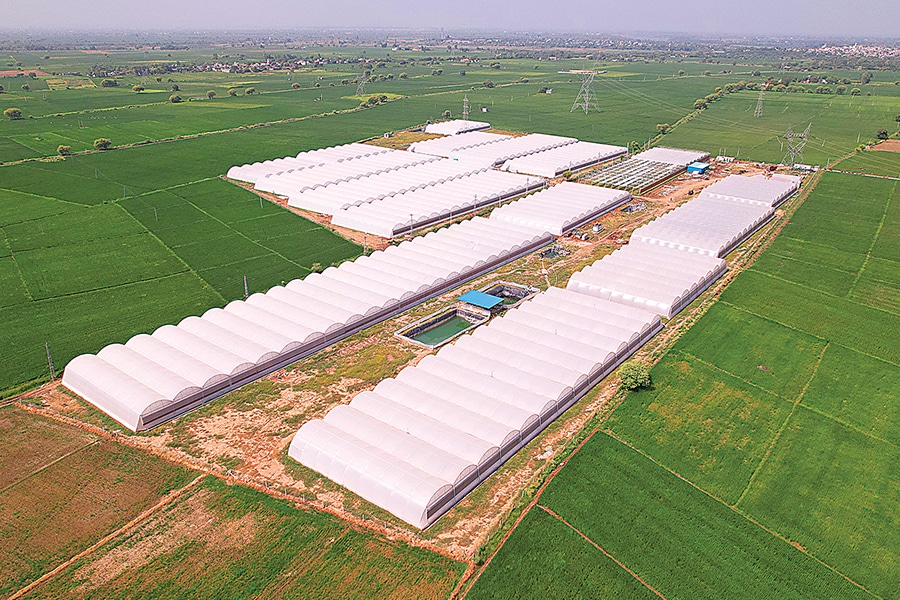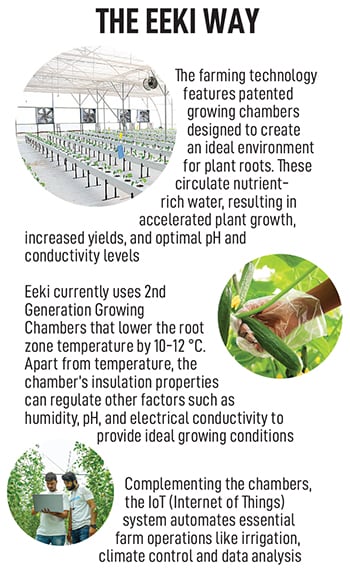Eeki Foods: Growing more food using less
Abhay Singh and Amit Kumar of Eeki Foods are growing staple vegetables using technology that is not just climate resilient and climate saving, but also reduces growing costs


When IITians Abhay Singh and Amit Kumar found they were hopping from one job to another every year or so, it led to some introspection. It wasn’t that they didn’t enjoy what they did. The IIT-Bombay graduates had worked in robotics and automation since their college days and continued doing that in their work life. It also wasn’t that the jobs were not lucrative. And yet, there was something that didn’t quite work.
“We were always happy building stuff, but despite that, we were quitting our jobs every 12 months, and the idea was we don’t want to do that," says Singh. Trying to understand why they were restless, the two concluded that they were working on jobs or projects that were temporary in nature whereas, “we both wanted to build something that would last for decades, if not centuries. That is the core, that feeling was missing", he adds.
In October 2017, stepping back, the two friends spent a few months trying to figure out what they really wanted to do and also “understand life in general". Which involved studying everything, from philosophy to political science, “everything we had never read before, to understand how the world works".
The two were in different cities—Kumar was in Delhi while Singh was at home in Rajasthan—and they exchanged notes until in early 2018 they zeroed in on land, water and food as focus areas. “We realised that arable soil is not going to increase over time while the population will. And then there was the impending climate change, so we have to figure out ways to grow more food using less [in terms of] resources," says Singh.
Neither of them had a great passion for agriculture, so it wasn’t a passion problem they were looking to solve but a “necessary problem that has to be solved", says Singh. Over the remaining months of 2018, they tried everything from traditional farming to hydroponics to understand what was required to shift the needle.
 The challenge with hydroponics, they realised, was that it was mainly used to grow greens and exotic vegetables, and the cost of growing was high. “It was nearly ₹100-200 a kilo and in moderate climates, ₹20-30 a kilo," says Singh, adding that even that was too high for wholesale. “We understood that you have to be able to grow more in a lesser area, but at the same time do that at a lower price. That’s the only way you can make a change possible."
The challenge with hydroponics, they realised, was that it was mainly used to grow greens and exotic vegetables, and the cost of growing was high. “It was nearly ₹100-200 a kilo and in moderate climates, ₹20-30 a kilo," says Singh, adding that even that was too high for wholesale. “We understood that you have to be able to grow more in a lesser area, but at the same time do that at a lower price. That’s the only way you can make a change possible."
All through, they kept their goal in mind: To grow staple high-quality vegetables, without pesticides, and which could be sold at mandi prices so that they would be accessible to all. Luckily, if not agriculture, they were interested in biology and plant science, so in 2019, from a rooftop in Kota to later one-fourth of an acre outside of Kota, they set about not just figuring what makes a particular plant tick in terms of nutrition but also technology that would have both climate resilience and climate saving built in.
They tried several iterations of hydroponics, working constantly on “how a plant reacts, what is the effect of say, calcium and potassium on the plant’s health? And how the roots are forming", says Kumar. Working on the roots, he adds, was the most specific part of the technology, “of how we can actually speed up the growth of the roots and make sure they have an ideal environment for growth, even in [extreme] temperatures like Rajasthan".
The two set up Eeki Foods in December 2018, their research farm outside of Kota in July 2019, finally starting commercial production in 2022. Today, with their patented polymer growing chambers and patent pending IoT technology that maintains the right root zone temperatures and humidity, they use 80 percent less water than traditional farming and solar panels for their energy needs. Moreover, their set-ups are often on barren land and considering the vegetables have ideal conditions of temperature, climate and nutrition, they are grown all year round, without being affected by the seasons.
 Eeki’s 15-acre farm in Rajasthan
Eeki’s 15-acre farm in Rajasthan
The company currently has 30 acres of operational farms, mostly with farming partners, in Rajasthan and Haryana, and another 30 acres under construction in Namana and Lakheri in Rajasthan which will become operational by March. The partnership model allows people to collaborate with Eeki by contributing land and capital or solely investing capital. Once the farms are set up, Eeki takes care of the day-to-day operations, including growing, harvesting and selling the produce to B2B clients.
Initially starting out with tomatoes, they now also grow cucumbers and currently do about 15 tonnes of produce per day at a growing cost of about 6-8 per kg, the founders say. They are also working on adding green chillies, musk melon, and eggplants to their platter. “It takes about a year, one-and-a-half years for us to master a crop. We research the crop, understand the complete cycle, grow it in summers, in winters, in the monsoon and we see it go through all those stages. And then we develop the chambers and nutrition according to the requirements. And then start commercial production," says Singh.
It’s been a challenging but also fun journey. At one point, during the pandemic, recalls Singh, they lost a whole crop because there was no electricity on the farm and they had to run around to get permissions to set up solar panels. “We had a hard time convincing the officials that we were actually farming because both Amit and I don’t look like farmers, and we didn’t have any tractors," he says.

It was also during Covid, between the two waves, in February 2021, that angel investor Rajesh Sawhney, founder and CEO of GSF Accelerator, drove down from Delhi to Kota for two days and quickly, in March, wrote them a cheque for about $150,000 through GSF. For Sawhney, hydroponics, as it existed back then, didn’t appear to be a scalable business model, but when he got there, he understood the “vision and the potential of their technology", he says, also pointing to their business model that has three components to it. “One is the bioengineering that they do to make beautiful vegetables the second is the whole water conservation, it’s a very, very water-efficient system and water is circulated back. And the third unique component of their business model is that they don’t take any energy from the grid, but make their own energy through solar. That is the vision of agriculture that I immediately related to, that is not only organic, but also self-sustaining."
At that time, recalls Singh, people were mostly interested in SaaS (software as a service) and software businesses because they are easier to scale rather than those like Eeki Foods, which requires three months for the factory set-up, another three months for the plants to start: “So half a year is actually gone before we start generating a single rupee from the investment". But when Avaana Capital came into the picture in February 2022 with a funding round of $2 million, they realised there were a lot of people, including in the VC community, who were trying to solve the problem.
Soon after that round, in April 2022, they raised $6.5 million in a Series A round led by General Catalyst with participation from Avaana Capital and Better Capital. Overall, says Singh, they have raised around ₹63 crore.
Anand Chandrasekaran, partner at General Catalyst, who calls the solution remarkable as well as sustainable considering it is independent of whether the land is arable, requires no soil, uses 80 percent less water and zero pesticides, says the company has demonstrated significant growth since its launch in H1 2022. “The expanding system, paired with a fully automated control centre overseeing the farms, is now operational across many acres," he says, adding that the demand has been high. “Simply addressing the existing farming partner waitlist will help meet their revenue goals."
In FY23, their revenues were ₹30 crore and they are looking at ₹63 crore in the year ending March 2024. “We’re looking at being Ebitda positive by October 2024," says Singh. Scaling is also very much part of the plan where they are looking to add 200 acres by March 2025, have 700 acres by March 2026 and also “get outside of India for farms in the Middle East", says Singh. The plan is also to move to more temperate climate regions “in north, central and south India", says Kumar, as well as have more Eeki-owned farms along with partner farms.

First Published: Mar 21, 2024, 18:34
Subscribe Now